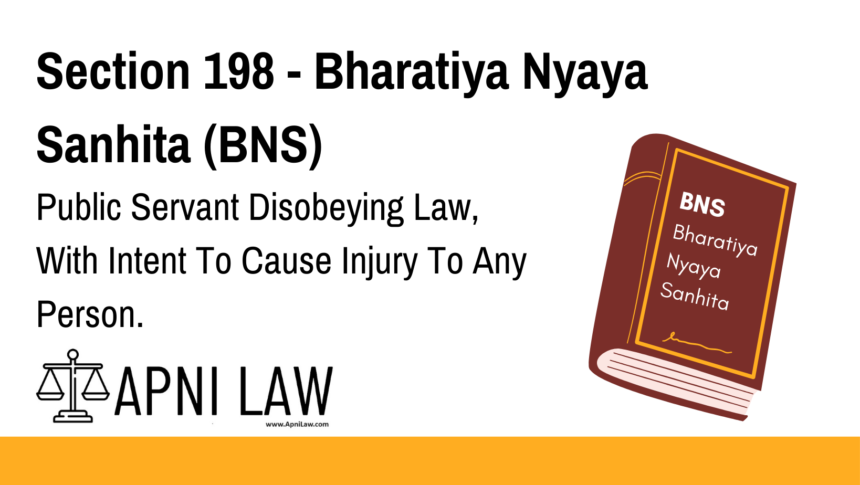Code: Section 198 BNS
Whoever, being a public servant, knowingly disobeys any direction of the law as
to the way in which he is to conduct himself as such public servant, intending to cause, or
knowing it to be likely that he will by such disobedience, cause injury to any person, shall be
punished with simple imprisonment for a term which may extend to one year, or with fine, or
with both.
A, being an officer directed by law to take property in execution, in order to satisfy a
decree pronounced in Z’s favour by a Court, knowingly disobeys that direction of law, with
the knowledge that he is likely thereby to cause injury to Z. A has committed the offence
defined in this section
Explanation of Section 198 BNS
Section 198 of the Bharatiya Nyaya Sanhita (BNS), 2023, penalizes public servants who knowingly violate legal directions in a way that causes harm to an individual. The section ensures accountability and ethical conduct in public service.
Key Elements of Section 198 BNS
- Applicability: This law applies only to public servants.
- Nature of the Offence:
- Knowingly disobeying legal directions regarding their official duties.
- Intent to cause injury or knowledge that such disobedience will likely harm a person.
- Punishment:
- Simple imprisonment up to one year
- Fine
- Both (depending on the severity of the act)
Illustration of Section 198 BNS
Example 1: Disobeying Court Orders in Property Seizure
A court orders Officer A to seize a debtor’s property to satisfy a legal decree in favor of Z. However, A deliberately refuses to follow this order, knowing that it will harm Z’s legal rights. A has committed an offence under Section 198 BNS.
Example 2: Ignoring Arrest Warrants
A police officer deliberately refuses to arrest a person against whom a valid court warrant exists, knowing that this will help the accused escape justice. This constitutes an offence under Section 198 BNS.
Example 3: Denying Medical Assistance in a Government Hospital
A government doctor, despite being legally required, refuses to provide medical care to a patient due to personal bias, causing the patient harm. This is punishable under Section 198 BNS.
Common Questions and Answers on Section 198 BNS
1. Who can be punished under Section 198 BNS?
- Answer: Only public servants (such as government officers, police, judges, or municipal employees) can be prosecuted under Section 198 BNS.
2. Is Section 198 BNS a cognizable offence?
- Answer: No, Section 198 BNS is a non-cognizable offence, meaning police cannot arrest without court approval.
3. What is the maximum punishment under Section 198 BNS?
- Answer: The punishment includes simple imprisonment up to one year, a fine, or both.
4. Can a public servant be dismissed from service for an offence under Section 198 BNS?
- Answer: Yes, if found guilty, disciplinary action including suspension, dismissal, or termination may be taken under service rules.
5. Does Section 198 BNS apply to corruption cases?
- Answer: While Section 198 BNS does not directly deal with corruption, if a public servant disobeys the law for personal gain and causes harm, they can be charged under both Section 198 BNS and anti-corruption laws.
Conclusion
Section 198 BNS ensures accountability among public servants by penalizing deliberate disobedience of legal duties that cause harm to individuals. It reinforces trust in public institutions by ensuring that officials act within the framework of the law.
For more legal updates, visit ApniLaw today! 🚀








